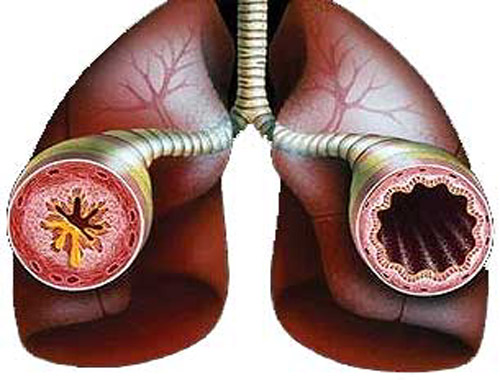Asthma
Asthma is a chronic inflammatory condition characterized by reversible or at least partially reversible constrictions of the bronchi in the lungs. Bronchi are muscular tubes that carry air throughout the lungs, transporting it to and from smaller airway branches called bronchioles. With asthma, the walls of the bronchi are inflamed and swollen. This narrows the airway and makes it more difficult to breathe, resulting in wheezing, breathlessness, or coughing. Acute asthma attacks or episodes increase this effect by constricting bronchi muscles and producing excess amounts of mucus. The diameter of the bronchi may decrease to the point that very little air can travel in or out. This causes the affected person to cough and wheeze, feel tightness in their chest, and struggle to breathe. Although the cause is not clear, asthma attacks can occur at any time but are especially frequent at night and in the morning. Severe asthma attacks can be life-threatening, often requiring immediate medical attention. The exact cause of asthma is unknown, but it is a complex interaction of different factors. The underlying problem seems to be the release of inflammatory molecules by cells in the lining of the bronchi in response to various stimulators or triggers. The triggers for asthma attacks will be slightly different for each person. Some of them are as follows: Allergens such as pollen, animal allergens (hair, cells), dust-spores, food; Non-allergic (occupational) allergens such as cleaning agents, hairdressing products, epoxy glues, smoke, chemicals; Exercise (exercise-induces asthma); Stress and strong emotional responses; Exposure to cold air; Some medicines such as beta blockers and aspirin; Many people with asthma, but not all, are allergic to specific substances. Asthma attacks can be triggered in these people by the allergens to which they are sensitive.
